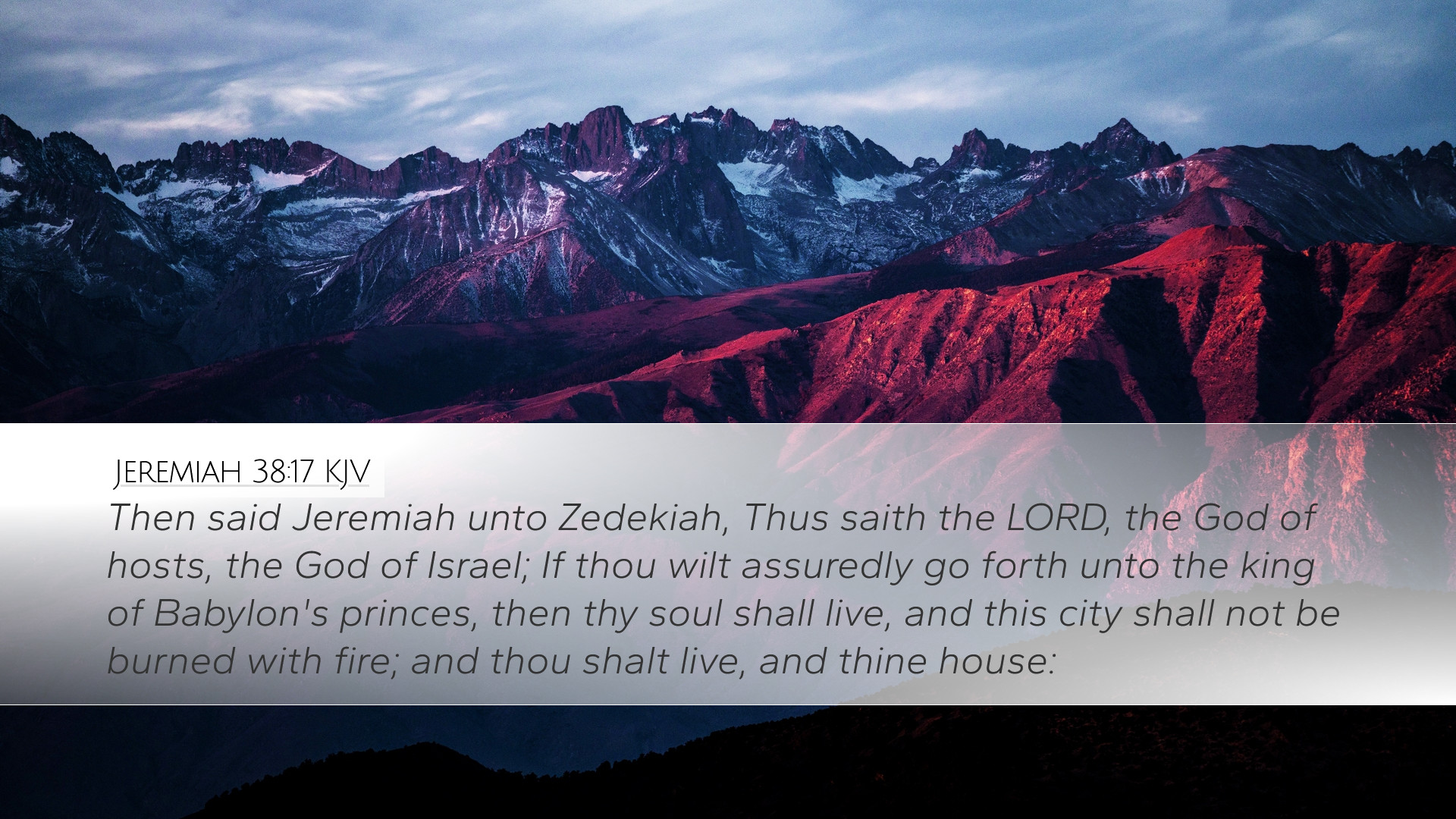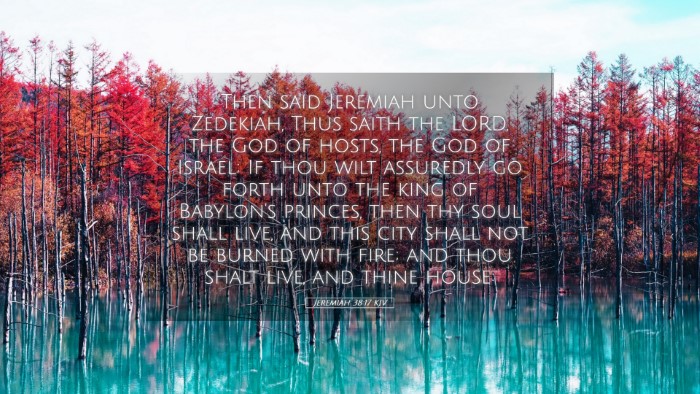Bible Commentary on Jeremiah 38:17
Verse Context
Jeremiah 38:17 states: “Then Jeremiah said to Zedekiah, ‘Thus says the Lord, the God of hosts, the God of Israel: If you will surrender to the officials of the king of Babylon, then your life shall be spared, and this city shall not be burned with fire, and you and your house shall live.’” This verse encapsulates Jeremiah's critical message to King Zedekiah, emphasizing the dire choices he faces amidst impending judgment.
Commentary Overview
This passage offers deep theological insights into obedience, surrender to God's will, and the prophetic role of Jeremiah. Commentaries from notable theologians will illuminate its meaning and implications for both the original audience and contemporary readers.
Matthew Henry's Commentary
Understanding Zedekiah's Dilemma
Henry highlights that King Zedekiah is at a crucial juncture. Faced with Babylon’s imminent siege, he must choose between fighting to maintain a precarious independence and surrendering to the will of God as conveyed through Jeremiah’s prophecy. Henry elaborates on the futility of resistance against divine decree, noting that Zedekiah’s surrender, while it may seem ignoble, is framed as a path to survival.
Prophetic Assurance
Henry notes that Jeremiah's message is rooted in God’s promise. If Zedekiah submits, his life and the lives of his children would be spared. This assurance reflects God’s mercy when His people humble themselves and acknowledge His sovereignty.
Albert Barnes' Commentary
The Call to Surrender
Barnes emphasizes the urgency of the prophet’s call. The Hebrew context points to a military crisis that gives weight to Jeremiah's admonition. He argues that Jeremiah's counsel serves not just as advice but as a divine command, urging Zedekiah to recognize the impending doom of rebellion against Babylon.
The Consequences of Rebellion
Barnes underlines how Zedekiah’s failure to heed this warning would lead to disastrous consequences, both for him and for Jerusalem. The notion that the city would “be burned with fire” should provoke serious reflection on the repercussions of spiritual disobedience and political folly.
Adam Clarke's Commentary
The Nature of Prophecy
Clarke's insights delve into Jeremiah’s role as a prophet, noting that his warnings are filled with profound truth and reflect a heart aligned with God's will. He asserts that true prophecy often involves the difficult task of proclaiming uncomfortable truths in hopes of turning hearts toward God.
Surrender as Salvation
Clarke elaborates on the paradox of surrendering to a foreign power as a means of salvation. He reflects on how this lesson resonates through scripture: that yielding to God, even in adversarial situations, aligns with divine purposes and can lead to ultimate salvation.
Theological Implications
Submission to God's Will
Combined insights from the commentators stress that the act of surrendering to God's will has universal application. Believers are often called to relinquish their own desires and submit to divine guidance, especially during times of crisis. This theme of surrender is critical in Christian thought and plays a significant role in theological discourse—highlighting the struggle between human will and divine authority.
God's Mercy and Judgment
The balance of God’s mercy and judgment displayed in this verse serves as a natural reminder for theologians and scholars alike: God desires for all to turn from their ways and live. The conditional promise made to Zedekiah is a testament to God's readiness to offer grace even in the face of impending judgment.
Practical Applications
- Leadership and Accountability: Pastors can draw parallels from Zedekiah's leadership plight, reflecting on the burdens of accountability in spiritual and secular realms.
- Embracing God's Will: This passage invites believers to consider how they respond to divine counsel in their own lives, especially during tumultuous periods.
- The Importance of Prophetic Voices: It underscores the importance of hearing and heeding prophetic messages in the church today, which may challenge prevailing attitudes or behaviors.
Conclusion
Jeremiah 38:17 is a richly layered text, revealing the weight of prophetic words and the importance of surrendering to God amid hardship. By exploring the insights of Henry, Barnes, and Clarke, we see a multifaceted call to obedience, grace, and spiritual integrity that remains relevant for today's believers and leaders alike.


